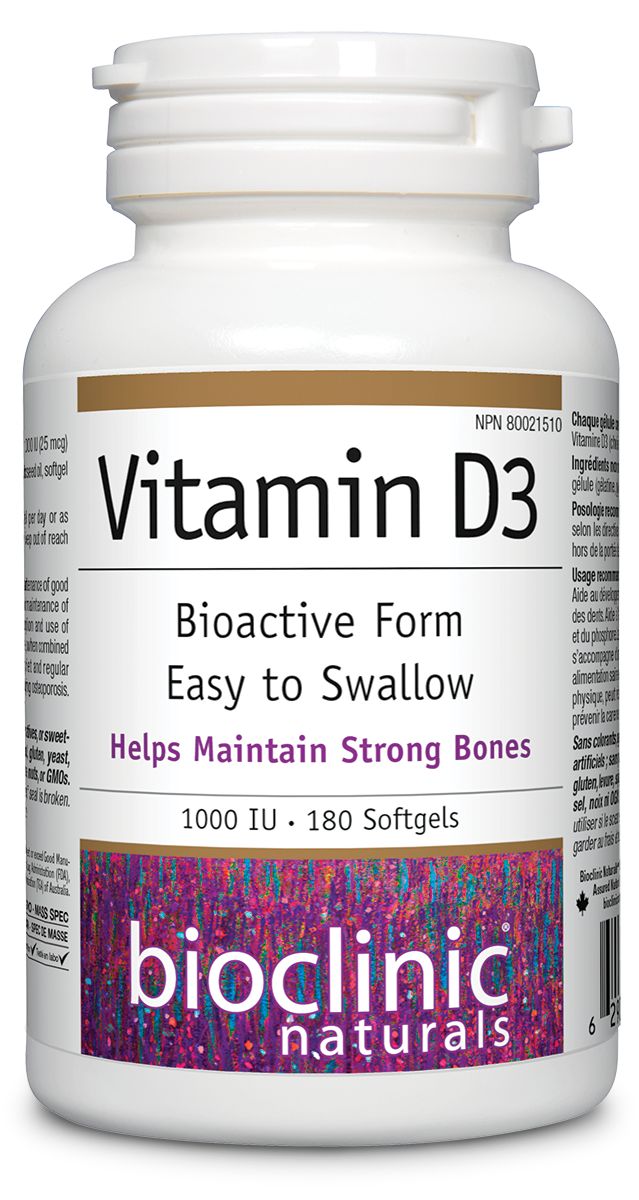
Bioactive Form Easy to Swallow
1000 IU
180 Softgels ( SKU: 9431, NPN: 80021510 )
Benefits
- Vitamin D3 (cholecalciferol) likely more effective at restoring blood levels than D2 form (ergocalciferol)16
- 1000 IU vitamin D per softgel allows for easy daily dosing
- Easy to swallow and highly bioavailable softgel
- In a base of organic flaxseed oil for improved intestinal absorption
Feature Summary
Vitamin D is a hormone now widely recognized to be important to many body systems and a large number of physiological processes and it may also be one of the most common nutrient deficiencies in the world.1,2 Many recent studies have linked lower levels to an increased risk of cardiovascular disease including hypertension, peripheral vascular disease, coronary artery disease and heart failure, as well as several types of cancer, autoimmune disease and type 2 diabetes.3,4,5,6 Vitamin D is needed for intestinal calcium absorption, skeletal bone integrity as well as skeletal muscle strength and function and has been associated with overall physical fitness.7,8,9 Vitamin D is critical for healthy immune function and may reduce the risk of infection, especially respiratory tract infections.10,11 Given that essentially every tissue in the body has a receptor for vitamin D, it is hard to overestimate its importance.12 Many practitioners recommend supplementation to achieve blood levels of 25-OH-vitamin D between 50-80 nmol/L, which often requires doses of 1000-2000 IU per day, and more for those with common genetic variants affecting vitamin D metabolism.13,14,15
Medicinal Ingredients
| Each Softgel Contains: | |
| Vitamin D3 (Cholecalciferol) | 1,000 IU (25 mcg) |
Non-Medicinal Ingredients
Organic flaxseed oil, softgel (gelatin, glycerin, purified water).
Dosage:
Recommended Adult Dose: 1 softgel daily or as directed by a health care practitioner. Keep out of reach of children.
Warnings:
Keep out of reach of children.
Allergens:
Contains no artificial colours, preservatives, or sweeteners; no dairy, starch, sugar, wheat, gluten, yeast, soy, corn, egg, fish, shellfish, salt, tree nuts, or GMOs. Sealed for your protection. Do not use if seal is broken. For freshness, store in a cool, dry place.
Contraindications
Caution is advised for individuals with a hypersensitivity to any of the ingredients, sarcoidosis, lymphoma, tuberculosis, hypercalcemia or renal impairment.
Drug Interactions
May increase the risk for hypercalcemia when taken with a thiazide medication (diuretic).17 Vitamin D may improve insulin sensitivity and lower blood pressure, requiring a reduction in dosage of hypertension and/or diabetic medications.
- Holick MF. Vitamin D deficiency. N Engl J Med. 2007 Jul 19;357(3):266-81.
- Adams JS, et al. Update in vitamin D. J Clin Endocrinol Metab. 2010 Feb;95(2):471-8.
- Pludowski P, Holick MF, Pilz S, et al. Vitamin D effects on musculoskeletal health, immunity, autoimmunity, cardiovascular disease, cancer, fertility, pregnancy, dementia and mortality-a review of recent evidence. Autoimmun Rev. 2013 Aug;12(10):976-89. doi: 10.1016/j.autrev.2013.02.004.
- Muscogiuri G, Sorice GP, Ajjan R, Mezza T, Pilz S, Prioletta A, Scragg R, Volpe SL, Witham MD, Giaccari A. Can vitamin D deficiency cause diabetes and cardiovascular diseases? Present evidence and future perspectives. Nutr Metab Cardiovasc Dis. 2012 Feb;22(2):81-7.
- Fletcher JM, Basdeo SA, Allen AC, Dunne PJ. Therapeutic use of vitamin D and its analogues in autoimmunity. Recent Pat Inflamm Allergy Drug Discov. 2012 Jan;6(1):22-34.
- Baz-Hecht M, Goldfine AB. The impact of vitamin D deficiency on diabetes and cardiovascular risk. Curr Opin Endocrinol Diabetes Obes. 2010 Apr;17(2):113-9.
- Wicherts IS, van Schoor NM, Boeke AJ, et al. Vitamin D status predicts physical performance and its decline in older persons. J Clin Endocrinol Metab. 2007;6:6.
- Mosele M1, Coin A, Manzato E, et al. Association between serum 25-hydroxyvitamin d levels, bone geometry, and bone mineral density in healthy older adults. J Gerontol A Biol Sci Med Sci. 2013 Aug;68(8):992-8. doi: 10.1093/gerona/glt008.
- Tieland M1, Brouwer-Brolsma EM, Nienaber-Rousseau C, et al. Low vitamin D status is associated with reduced muscle mass and impaired physical performance in frail elderly people. Eur J Clin Nutr. 2013 Oct;67(10):1050-5. doi: 10.1038/ejcn.2013.144.
- Tran B1, Armstrong BK, Ebeling PR et al. Effect of vitamin D supplementation on antibiotic use: a randomized controlled trial. Am J Clin Nutr. 2014 Jan;99(1):156-61. doi:10.3945/ ajcn.113.063271.
- Ginde AA1, Mansbach JM, Camargo CA Jr. Association between serum 25-hydroxyvitamin D level and upper respiratory tract infection in the Third National Health and Nutrition Examination Survey. Arch Intern Med. 2009 Feb 23;169(4):384-90. doi:10.1001/archinternmed.2008.560.
- Rosen CJ, et al. The nonskeletal effects of vitamin D: an Endocrine Society scientific statement. Endocr Rev. 2012 Jun;33(3):456-92.
- A. Zittermann, S. Iodice, S. Pilz, et al. Vitamin D deficiency and mortality risk in the general population: a meta-analysis of prospective cohort studies. Am J Clin Nutr, 95 (1) (2012), pp. 91–100.
- Garland CF, French CB, Baggerly LL, et al. Vitamin D supplement doses and serum 25-hydroxyvitamin D in the range associated with cancer prevention. Anticancer Res. 2011 Feb;31(2):607-11.
- Drincic A1, Fuller E, Heaney RP, Armas LA. 25-Hydroxyvitamin D response to graded vitamin D3 supplementation among obese adults. J Clin Endocrinol Metab. 2013 Dec;98(12):4845-51. doi: 10.1210/jc.2012-4103.
- Logan VF1, Gray AR, Peddie MC, et al. Long-term vitamin D3 supplementation is more effective than vitamin D2 in maintaining serum 25-hydroxyvitamin D status over the winter months. Br J Nutr. 2013 Mar 28;109(6):1082-8. doi: 10.1017/S0007114512002851.
- Boulard JC, Hanslik T, Alterescu R, Baglin A. [Symptomatic hypercalcemia after vitamin D-thiazide diuretics combination. Two cases in elderly women]. Presse Med. 1994 Jan 22;23(2):96.
Related Documents
- Vitamin D3 1000 IU Product Specifications.pdf
- Neurological Protocol: Restoring Neurological Function
- Spinal Pain Protocol: Reducing Chronic Degenerative Lumbar Disc Pain
- Osteoarthritis Protocol: Restoring Joint Function
- Rheumatoid Arthritis Protocol: Restoring Joint Function
- Intestinal Permeability Vitamin D and Autoimmune Disease - Dr. Pizzorno
